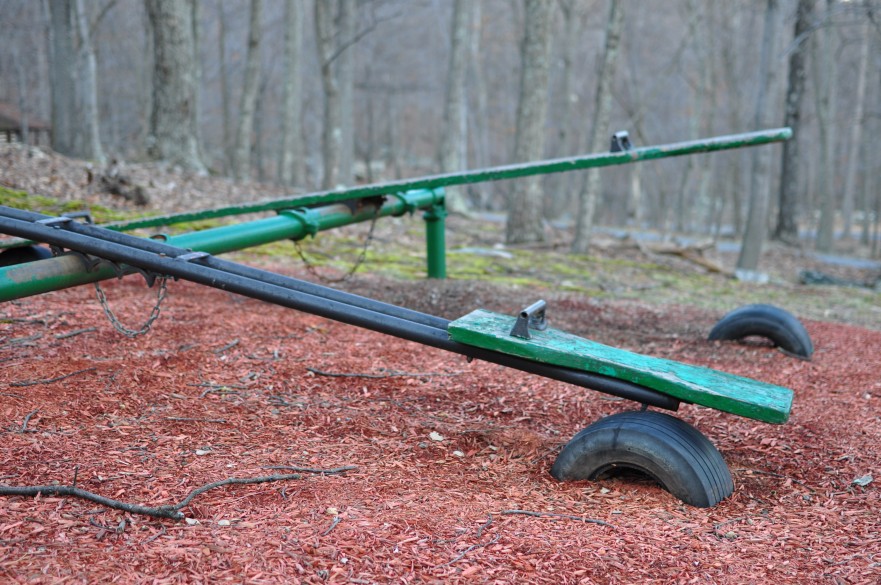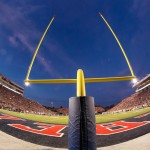When I think back on my school days, my most vivid memories happened on the playground. I remember jumping off the see saw so my friend would fall to the ground. I remember climbing to the top of the jungle gym and sitting like I was the king of recess. I remember racing out the door as soon as it opened to get the best ball or the fastest swing. I remember being picked last for football games. I remember being laughed at because I couldn’t shoot a basketball. I remember the rush of kicking a home run in a kickball game. I remember the pain of entering 5th grade and no longer being allowed on the part of the playground with all of the fun equipment.
There were great things about the playground and there were some not so great things. However, I survived recess and made it to adulthood very much alive. With the exception of a few emotional scars, the only noticeable scar I have is on my face. It happened when I slipped and fell down the jungle gym. Recess was important to me and it is where I learned how to apply the majority of the social skills I use as an adult.
As a classroom teacher, I have recess duty 5 days a week. I watch the kids at my school play. Their recess is vastly different from mine. When I was a kid, there were so many cool things to play on. We had slides, jungle gyms, merry go rounds, seesaws, and barrels to climb through. Those things are relics of the past after one too many children got hurt and schools became afraid of being liable for injuries.
Something missing from my memories of recess is adults. I know they were there, but they always seemed to be on the other side of the playground. If I needed them I could go get them but they did not seem to hover over us. They didn’t get involved in our games or stand next to us to make sure we didn’t get hurt. They didn’t force us to play with the kids who cheated or didn’t take turns. Recess is the one of the few times that teachers can be almost completely hands off in a safe environment for students. Students know there are adults around but they should feel free to be themselves. They should feel free to practice life skills such as kindness, fair play, and appropriate ways to converse with peers that we teach them. They should feel trusted that we won’t interfere in their time unless they need us. Recess is a 15-30 time in which they can practice being an independent person in control of their own choices. If they make a bad choice, teachers are there to help them. Recess is a safe place for students to make mistakes. Parents and teachers are not always going to be around so we have to ensure that our children are mature enough to make good decisions on their own. In the book, The Lord of the Flies, a group of young boys were left alone on an island. They were forced to create their own rules to be able to get along and survive. Students can use recess to create their own rules like they will need to do when they are adults. Granted things didn’t work out so well at by the end of book but we will be there to monitor to make sure our students are still safe.
This brings up another point with recess. Are we giving too many rules to kids? Here are some of the rules that we enforce during my duty. No fighting. No cussing. No running around the equipment. No footballs. No playing tag or any game where you have to “tag” another student. No pushing each other on the swings. No hanging from the equipment. No running up the slides.
Some of these rules are no-brainers, but some could be a little too strict. At my school, 3rd, 4th and 5th graders have a separate area with a swing set, a balance bar, a few things for children to climb on, 2 basketball courts and a grassy field about the size of a football field to play in. We do not have basketballs for them to use so that part of the playground is rarely used. The grassy field is a popular place but students do not seem to know what to do out there. They race sometimes but that gets boring after a few attempts or they get tired. They chase each other but since they can’t play tag they don’t know what to do once they reach the friend they are chasing. Some boys bring a soccer ball from home and they like to play soccer on one end of the field. (I will note that these 15-30 boys have been playing soccer since August and I have never heard of a single issue with them playing and they play at the part of the field that is furthest from adult supervision.) In the area I teach, many students are exposed to extreme issues of violence. Because of this, I know that some students in the past have gone from playing tag safely, to hitting one another, to full on fights. Friendly games of football have turned into brawls among students. I am curious to learn the number of students involved in these issues. Is it really fair to make rules to restrict students who can appropriately play because a few do not? Adults have shown time and time again that we cringe at any law that we feel is too restrictive. How do we think children feel about this? When did we get so afraid of children getting hurt? When did adults forget the joy we had as we flew off a fast merry round and rolled laughing across the grass? I know a seesaw could knock out a tooth but isn’t getting hurt a right of childhood passage? Experience is the best teacher and once I got hurt by something I did not do it again. So why did we let all the seesaws go?










Comments 2
Two thoughts come to mind when I read this – first, when kids are left to themselves, things usually turn out better than they did in the Lord of the Flies. Second, we have way too many rules. At my school each teacher is expected to spend a couple of days with all their classes and develop some kind of agreement thing. I forget what it’s called, but the idea is that if kids have input into rules and punishment there will be more buy-in and better behavior. For the past two years, I’ve offered one rule, that I got from Dave Burgess of Teach Like a Pirate: Don’t Be Mean. Kids sign it and we call it good. I those two years I’ve written one classroom referral and haven’t come close to calling for an administrator. We’ve had our issues, and I’ve sent kids to buddy teachers to get them away for awhile, but mostly we settle things as they come up.
Great points Donnie. I was recently trained in playground (for lack of a better term) and we were taught to implement specific structures and games to reduce playground liabilities. What we have seen is kids wanting to play the games taught in PE, playing imaginary games of various social structure on the play structure, or one massive (yet organized game) of soccer on the field involving the majority of our students and using 3 balls. The game is orderly, has teams and has rules. Kids really do come up with the most amazing games!